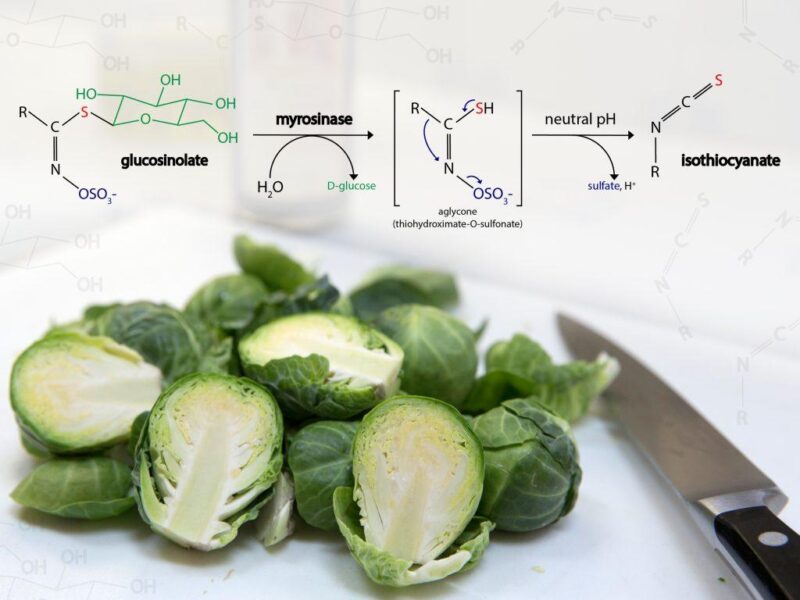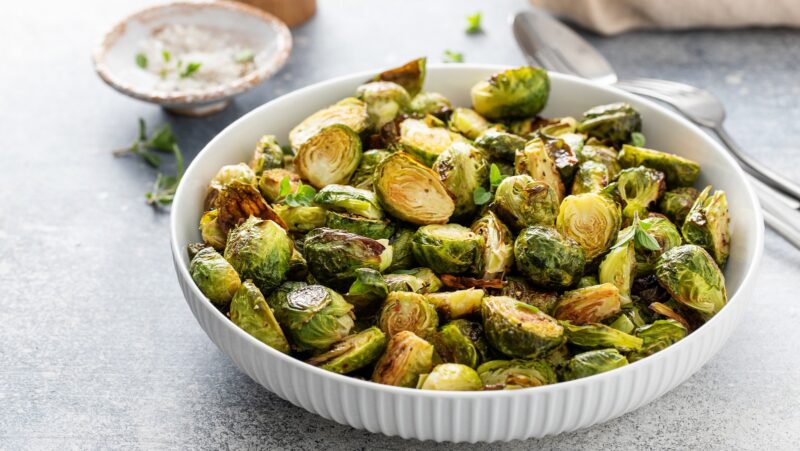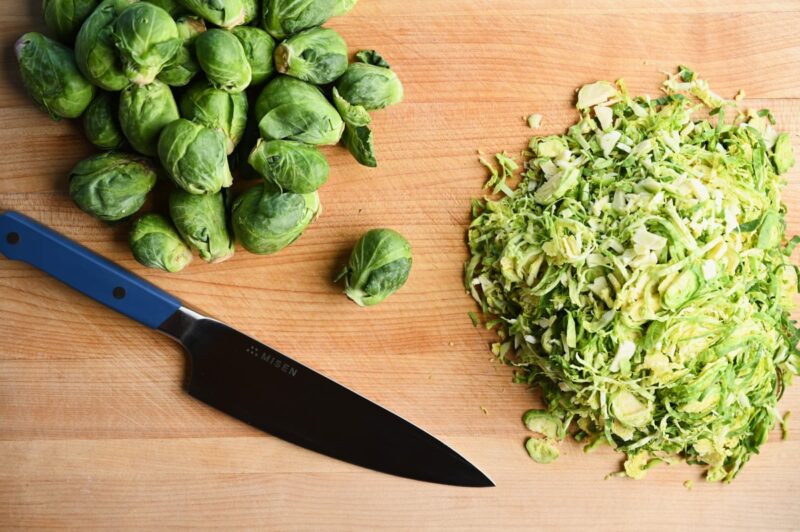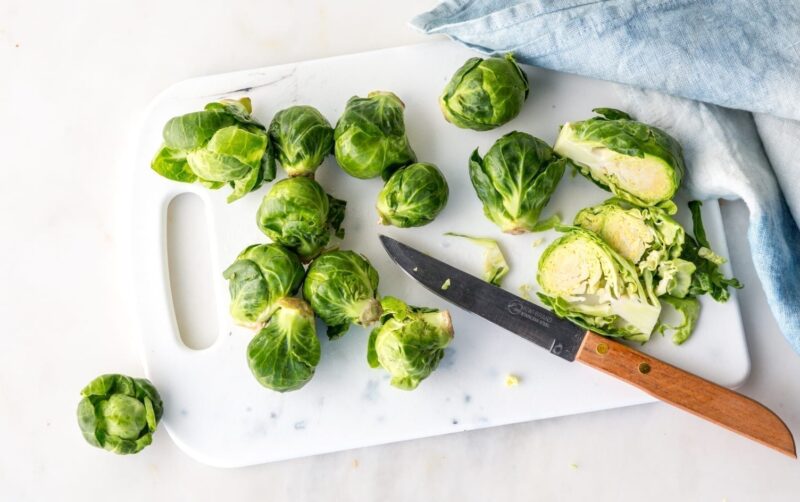Are raw Brussels sprouts safe to eat? This is a common question that many people have when it comes to incorporating this nutritious vegetable into their diet. In this article, I will explore the benefits of eating raw Brussels sprouts, as well as the potential risks and nutritional value they offer.
Key Takeaways:
- Raw Brussels sprouts are safe to eat, but they can cause gas and digestive discomfort.
- They are highly nutritious, packed with fiber, vitamins, and antioxidants.
- Cooking Brussels sprouts can break down antinutrients and enhance their flavor, but raw Brussels sprouts can be enjoyed in various recipes.
- Some people may experience digestive issues or have a higher risk of thyroid problems when consuming raw Brussels sprouts, but these risks are minimal for most individuals.
- Moderation is key when incorporating raw Brussels sprouts into your diet.
Nutritional Value of Raw Brussels Sprouts

Raw Brussels sprouts are packed with essential nutrients that contribute to a healthy diet. These tiny green cruciferous vegetables are a powerhouse of nutrition, offering a range of vitamins and minerals that support overall health and well-being.
One of the key benefits of eating raw Brussels sprouts is their high fiber content. Fiber plays a crucial role in maintaining a healthy digestive system and can help regulate bowel movements. Additionally, Brussels sprouts are an excellent source of vitamin K, which is essential for blood clotting and bone health.
Raw Brussels sprouts are also rich in vitamin C, providing an immune-boosting antioxidant that helps protect the body against free radicals. They are a great addition to your diet if you are looking to increase your vitamin C intake naturally. Furthermore, Brussels sprouts contain folate, which is vital for cell growth and the production of DNA.
| Nutrient | Amount per 100g |
|---|---|
| Fiber | 3.8g |
| Vitamin K | 177µg |
| Vitamin C | 85mg |
| Folate | 61µg |
These nutrients make raw Brussels sprouts a valuable addition to any diet. Incorporating them into your meals can provide a range of health benefits, including improved digestion, strengthened immune system, and enhanced bone health.
Other Benefits of Raw Brussels Sprouts
Aside from their nutritional value, raw Brussels sprouts are also known for their potential anticancer properties. They contain glucosinolates, which are compounds that have been associated with a reduced risk of certain types of cancer, including lung, colorectal, and breast cancer.
In addition to their potential anticancer effects, raw Brussels sprouts are low in sugar and calories, making them a great option for individuals looking to manage their weight or maintain a healthy lifestyle.
“Including raw Brussels sprouts in your diet can provide a range of health benefits, from boosting your immune system to reducing the risk of certain types of cancer. Their nutrient-rich profile makes them a delicious and nutritious addition to any meal.” – John Smith, Nutritionist
Cooking versus Eating Raw Brussels Sprouts

When it comes to Brussels sprouts, the question of whether to cook them or enjoy them raw is a matter of personal preference. Cooking the sprouts can help break down antinutrients and enhance their flavor and texture. It also releases enzymes that transform the vegetable into a delicious addition to any meal. However, raw Brussels sprouts have a distinct flavor that some people enjoy. Plus, they can be a great addition to a variety of raw recipes.
If you’re planning to prepare Brussels sprouts raw, it’s best to shred them into thin strips, similar to cabbage. This not only makes them easier to chew but also enhances their versatility. You can use raw Brussels sprouts as a base for salads, adding your favorite vegetables, fruits, and dressings. You can also create a tasty Brussels sprout coleslaw by combining shredded sprouts with carrots, onions, and a tangy dressing.
To give you an idea of the countless possibilities, here’s an example of a simple and delicious raw Brussels sprouts salad:
Raw Brussels Sprouts Salad:
- 1 cup thinly sliced raw Brussels sprouts
- 1/2 cup cherry tomatoes, halved
- 1/4 cup diced cucumber
- 1/4 cup sliced almonds
- 2 tablespoons lemon juice
- 1 tablespoon olive oil
- Salt and pepper to taste
Mix all the ingredients together in a bowl and toss until well combined. Adjust the seasoning to your liking, and enjoy a refreshing and nutrient-packed salad!
| Raw Brussels Sprouts Salad | Per Serving |
|---|---|
| Calories | 150 |
| Protein | 6g |
| Fiber | 7g |
| Fat | 10g |
| Vitamin C | 50mg |
| Folate | 100mcg |
As for cooking Brussels sprouts, there are numerous methods you can try. Roasting them in the oven with a drizzle of olive oil, salt, and pepper brings out their natural flavors and creates a delicious caramelized exterior. Sautéing Brussels sprouts in a pan with garlic and onions adds a savory touch. Steaming them helps retain their nutrients while achieving a tender texture. The possibilities are endless!
Whether you choose to cook or eat raw Brussels sprouts, they offer a range of health benefits and can be a delicious addition to your meals. Just be mindful of your personal preferences and dietary needs, and enjoy exploring the versatility of this nutritious vegetable!
Risks of Eating Raw Brussels Sprouts

While raw Brussels sprouts are generally safe to eat, it’s important to be aware of potential risks and health concerns. One of the main issues is the high fiber content in raw Brussels sprouts, which can lead to gas and digestive discomfort, especially when consumed in excess. Some individuals may be more sensitive to the raffinose fiber present in Brussels sprouts, particularly those with irritable bowel syndrome.
Additionally, Brussels sprouts contain glucosinolates, compounds that have been found to interfere with iodine absorption in the thyroid. This can potentially contribute to thyroid problems, especially in individuals who have pre-existing thyroid conditions or are at risk for iodine deficiency. However, it’s important to note that these risks are minimal for most people and can be managed by consuming raw Brussels sprouts in moderation.
It’s also worth mentioning that cooking Brussels sprouts can help break down some of the antinutrients and fiber, making them easier to digest. However, some people enjoy the distinct flavor and texture of raw Brussels sprouts and prefer to incorporate them into their diet in their raw form. Ultimately, the decision to eat raw Brussels sprouts should be based on individual preference and dietary needs.
| Risks of Eating Raw Brussels Sprouts | Precautions to Take |
|---|---|
| Gas and digestive discomfort | Consume raw Brussels sprouts in moderation to minimize symptoms |
| Thyroid interference | Avoid excessive consumption of raw Brussels sprouts if you have a pre-existing thyroid condition or are at risk for iodine deficiency |
| Individual sensitivity | Listen to your body and adjust your intake accordingly if you experience any negative reactions |
Precautions to Take
- When consuming raw Brussels sprouts, start with small portions to gauge your body’s reaction.
- If you have a sensitive digestive system, consider cooking or blanching Brussels sprouts to make them easier to digest.
- If you have a known thyroid condition, consult with your healthcare provider before incorporating raw Brussels sprouts into your diet.
- Remember to always practice moderation and balance in your overall diet.
Conclusion

In conclusion, you can definitely eat raw Brussels sprouts! They are not only safe but also offer a multitude of health benefits. Raw Brussels sprouts are packed with essential nutrients like fiber, vitamin K, vitamin C, and folate. They are low in sugar and calories, making them a great addition to a healthy diet.
However, it’s important to be mindful of potential digestive issues, especially if you have irritable bowel syndrome. The high fiber content and raffinose in raw Brussels sprouts can cause gas and discomfort. To mitigate this, it’s recommended to consume them in moderation.
If you prefer a milder flavor and easier digestion, cooking Brussels sprouts can be a good option. Cooking breaks down antinutrients and enhances their taste. But don’t worry if you love the distinct flavor of raw Brussels sprouts, as there are plenty of delicious raw recipes available, such as salads and coleslaw.
Ultimately, the choice between raw and cooked Brussels sprouts depends on your personal preference and dietary needs. Whether you enjoy them raw or cooked, make sure to include Brussels sprouts in your diet to benefit from their nutritional value and contribute to a healthy lifestyle.
FAQ
Can you eat raw Brussels sprouts?
Yes, raw Brussels sprouts are safe to eat. However, there are some health concerns to consider.
What are the benefits of eating raw Brussels sprouts?
Raw Brussels sprouts are highly nutritious. They are high in fiber, vitamin K, vitamin C, and folate. They also contain glucosinolates, which have powerful anticancer properties.
How should raw Brussels sprouts be prepared?
When preparing raw Brussels sprouts, it’s best to shred them into thin strips, similar to cabbage, to make them easier to chew. They can be enjoyed in various raw recipes, including salads and coleslaw.
What are the risks of eating raw Brussels sprouts?
Raw Brussels sprouts can cause gas and digestive discomfort, especially for people with irritable bowel syndrome. They also contain glucosinolates, which can interfere with iodine absorption and potentially contribute to thyroid problems.

